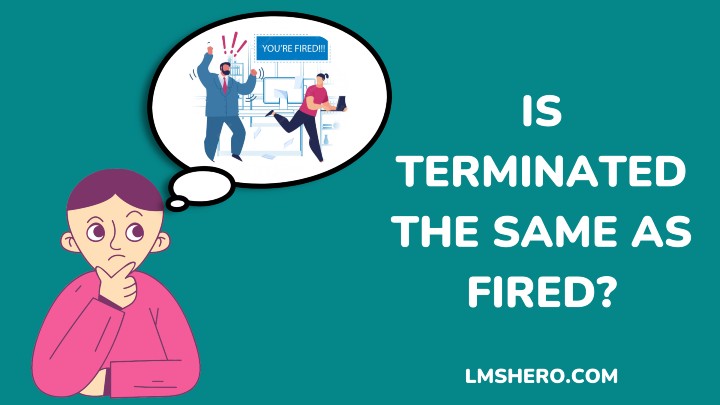“Terminated” and “fired” are often applicable in job circles and sometimes carry the same meaning.
However, while these words refer to the end or dissolution of an employee’s employment by the employer, they somewhat carry different meanings.
So what differences exist between getting fired and having your employment terminated? What are the reasons for the termination of an employee’s employment? And can your employer fire you verbally, as you’ve seen in movies?
This article explores why getting fired and having your employment terminated are not necessarily the same.
What is the difference between getting fired and terminated employment?
Getting fired is due to direct reasons concerning an employee, while termination can stem from various reasons specific to the employee or employer.
The table below outlines the differences between a job termination and getting fired.

| Fired | Termination |
| Getting fired is when an employee’s contract with an employer is dissolved for reasons specific to the employee. | Termination refers to the end of an employee’s job for reasons specific to the employer or the employee. |
| Getting fired might be a result of performance issues or policy violations. | Termination covers all forms of employee contract discontinuation and includes one initiated by the employee. |
| Reasons for firing may vary from insubordination and poor performance to company policy violations like sexual harassment. | Termination can result from at-will employment, temporary employment, company bankruptcy, reorganization, budget cuts, or policy violations. |
Furthermore, employee termination can occur in two forms;
- Voluntary termination
- Involuntary termination
Voluntary termination
This refers to an employee voluntarily leaving a company through a willful or recommended resignation.
Willful resignation can result from the employee receiving a better offer from a new employer or for other reasons best known to the employee.
Recommended resignation, however, mainly occurs when an employer or the company’s administration advises an employee to tender his/her resignation.
This sometimes happens when they seek to protect the company image and the career record of the employee.
For example, the resignation of a manager due to backlash from the public about a controversial statement made by that manager.
Involuntary termination
This occurs when an employee’s employment contract is terminated for reasons specific to the company. Some of these reasons include the following:
- Retirement
- Temporary employment contract
- Budget cuts
- Employer’s death
- Reorganization procedure
- Bankruptcy
- At-will employment
- Violation of company policies
- Poor performance
Among these reasons for involuntary termination is mostly used when an employee performs poorly or violates company policies.
You cannot consider an employee to have been fired when their employment ends due to old age or temporary employment.
Furthermore, employees can not be fired in special company situations like reorganization, employer death, or bankruptcy.
Firing
You can consider an employee fired due to certain company violations when their employment ends. These include not meeting company standards (poor performance) or violating company policies;
- Failing drug tests and the use of illegal drugs/substances
- Drinking during work hours
- Engaging in physical fights during work hours
- Insubordination to superiors
- Sexual harassment
- Repeated late coming
What are examples of wrongful termination?
Wrongful termination means being fired by your employer for illegal reasons. Common examples of wrongful termination include discrimination against your race, religion, gender, sexuality, disability, or ethnic background.
It can also include getting fired for retaliatory reasons like refusing to have a sexual affair with your employer or refusing to work for free. Additionally, wrongful termination is a contractual breach or violation of federal anti-discrimination laws.
Is termination the same as laid off?
Yes, you can use the term “termination” to describe a worker being laid off. In addition, termination covers all forms of employee dissolution, from getting fired to massive retrenchment.
A laid-off worker had their employment terminated due to reasons specific to the company.
Some of these reasons include company bankruptcy, restructuring of the organization, or at-will employment, among others.
Can you dismiss an employee verbally?
No, it is illegal to dismiss an employee verbally by yelling, “you’re fired,” as seen in numerous movies.
Employers must state the dismissal of an employee, the reasons for dismissing that employee, and the date of dismissal in writing.
If an employer dismisses you verbally without giving you the aforementioned written notification, you can consider it unfair.
Verbal dismissals are also a breach of the Workers’ Statute and become inadmissible in the case of a legal dispute.
A written communication remains the only acceptable means of employee dismissal. Acceptable methods of disseminating dismissal notifications include official emails, letters, registered fax, etc.
Can you refuse to accept a dismissal letter?
No, you cannot refuse to accept a dismissal letter from your employer. You will obstruct your dismissal if you disregard the notification and decline to accept the letter.
This is exceptionally true when your employer sends the dismissal notice to the right postal address.
As long as your employer has notified you of your dismissal via a written letter in a suitable manner, your deliberate refusal to accept it cannot amount to a lack of communication. Hence, you cannot claim foul play in a legal suit.
Additionally, you should sign the letter of dismissal. Sign the letter, date it, and indicate that you are “non-compliant” if unsure.
Signing the dismissal letter merely serves as notice; it does not imply that you accept the information it contains.
FAQs
What are things you can do after being fired wrongly?
If you are in this situation, consult an attorney with evidence of wrongful termination.
Can you sue an employer for verbally dismissing you?
Yes, you can take legal action against an employer for verbally dismissing you. If you allege that you were verbally fired, you must also provide proof of your claim.
Conclusion
Getting fired signifies that the business terminated your job for reasons unique to you. Some businesses may also use the term “terminated” to describe this. However, termination refers to all means an employee is let go.
For example, you can classify your willful resignation from a company as a voluntary means of termination.
Termination through budget cuts or company dissolution does not directly correlate with your performance or attitude, and you cannot terminate it as a firing. You can, however, refer to such forms of termination as a layoff.
Finally, while getting fired is inevitable in many work situations, it can harm your career. Find out how getting fired from a job can affect future employment opportunities.
I hope you found this article helpful. Thanks for reading.






